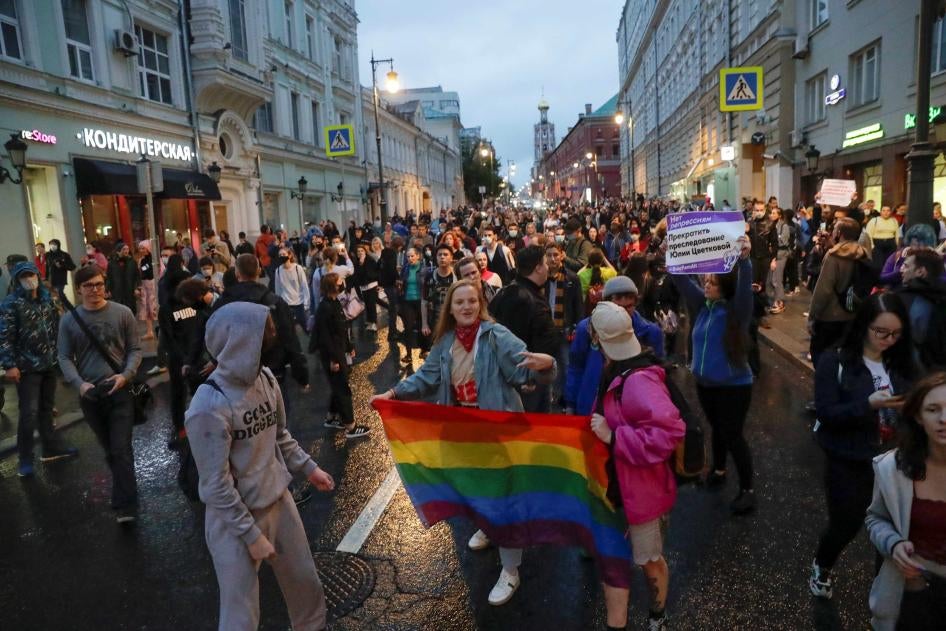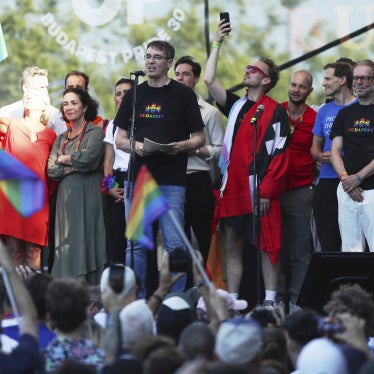(Berlin) – Russia’s Supreme Court ruled today that the “international LGBT movement” is an “extremist organization,” jeopardizing all forms of LGBT rights activism in the country, Human Rights Watch said today.
In a closed hearing, the Supreme Court ruled in favor of the Justice Ministry’s lawsuit accusing the “LGBT movement” of inciting social and religious discord. Russian authorities should immediately end this perverse persecution of LGBT people and concerned countries should support LGBT people and their advocates facing extreme risks and persecution in Russia.
“The authorities’ move apparently serves a dual purpose,” said Tanya Lokshina, associate Europe and Central Asia director at Human Rights Watch. “It is meant to increase the scapegoating of LGBT people to appeal to the Kremlin’s conservative supporters before the March 2024 presidential vote and to paralyze the work of rights groups countering discrimination and supporting LGBT people.”
Under Russian criminal law, participating in or financing an extremist organization is punishable by up to 12 years in prison. A person found guilty of displaying such groups’ symbols faces up to 15 days in detention for the first offense and up to four years in prison for a repeat offense. The authorities may include individuals suspected of involvement with an extremist organization in the countrywide “list of extremists” and freeze their bank accounts. People deemed to be involved with an extremist organization are barred from running for public office.
In a November 28 submission to the Supreme Court, seven prominent Russian rights groups said that a decision to support the Justice Ministry’s lawsuit would be discriminatory and violate a wide range of rights. Since the organization the government sought to outlaw, the “International LGBT Movement,” does not exist, human rights defenders fear that the ruling will allow the authorities to arbitrarily prosecute anyone for any activities related to LGBT rights.
Russian authorities have long misused Russia’s broad and vague anti-extremism legislation to prosecute peaceful critics. In 2021, the Moscow City Court banned three groups affiliated with leading opposition figure Alexey Navalny as extremist. The authorities then brought new charges against the already imprisoned politician, accusing him of organizing an “extremist community” and inciting extremist activities, which resulted in an additional 19-year sentence.
At least four Navalny supporters were sentenced to prison on a range of extremism charges. Dozens of his supporters across the country were fined and arrested over old social media posts mentioning his anti-corruption work and other projects.
Additionally, for over a decade, Russian authorities have exploited Russia’s pernicious “gay propaganda” law to target LGBT people and activists. In December 2022, the parliament toughened the 2013 “gay propaganda” ban by extending it to cover all public information or activities supporting LGBT rights or displaying non-heterosexual orientation.
The legislation does not provide any exclusion for art, scientific studies, or education and perpetuates a false and damaging messaging that tries to link LGBT people with pedophiles, repeatedly referring to “propaganda of nontraditional sexual relations and/or preferences, pedophilia, and sex change.”
On November 13, during the fourth Universal Periodic Review of Russia’s human rights record at the United Nations Human Rights Council, Andrey Loginov, Russia’s deputy justice minister, claimed that there is no discrimination based on sexual orientation or gender identity in Russia because the prohibition of discrimination is enshrined in the constitution. At the same time, he described “gay propaganda” as “alien to spiritual and moral values of our multiethnic and the polyconfessional Russian society.”
Since 2021, after lawmakers included a ban on same-sex marriage in Russia’s constitution, authorities have designated 17 LGBT organizations as “foreign agents,” a term that in Russian has connotations of spying and engaging in sabotage. This designation subjects the groups to a range of stifling and stigmatizing requirements.
Earlier in 2023, Russia’s parliament adopted legislation that violates a wide range of transgender people’s rights. It bans health care needed by trans people, changing gender markers in official documents, and dissolving marriages of trans people. It also prevents trans people from adopting or taking guardianship over children.
With Russian LGBT rights organizations and activists already in jeopardy and the risk of prosecution exacerbated by the Supreme Court’s “extremism” ruling, countries around the world should provide safe haven to those forced to flee Russia in the face of criminal prosecution or other grave threats, Human Rights Watch said.
Other countries, and the European Union member states in particular, given their geographic proximity, should also enable activists who continue LGBT rights work in Russia to obtain long-term visas in case of emergency or to attend international events and meetings with colleagues, along with providing other support to Russian LGBT rights activists working inside Russia or from abroad.
“The assault on LGBT rights has become a symbol of Russia’s rejection of universal human rights, as the government positions Russia as the defender of so-called traditional values in opposition to ‘the collective West,’” Lokshina said. “Russian LGBT people need support now more than ever.”








